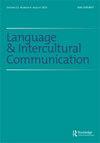欢迎语言:向学校工作人员教授一门“难民语言”,以实施作为双向过程的融合原则
IF 2.2
1区 文学
0 LANGUAGE & LINGUISTICS
引用次数: 0
摘要
在这篇文章中,我们讨论了一个项目的成果,该项目将阿拉伯语作为“难民语言”教授小学工作人员,以便他们能够欢迎说阿拉伯语的儿童和家庭。该项目基于对社会正义和包容性教育实践的承诺,以及对融合作为双向过程的理解。评价结果表明,向初级工作人员教授阿拉伯语对讲阿拉伯语的儿童和家庭以及工作人员本身的做法产生了积极的影响本文章由计算机程序翻译,如有差异,请以英文原文为准。
Welcoming Languages: teaching a ‘refugee language’ to school staff to enact the principle of integration as a two-way process
In this article we discuss the outcomes of a project which taught Arabic as a ‘refugee language’ to primary school staff so they could welcome Arabic speaking children and families. The project was grounded in a commitment to social justice and inclusive education practices, and in an understanding of integration as a two-way process. The evaluation shows that teaching Arabic to primary staff had a positive impact on Arabic speaking children and families, on staff’s own practice
求助全文
通过发布文献求助,成功后即可免费获取论文全文。
去求助
来源期刊

Language and Intercultural Communication
Multiple-
CiteScore
3.00
自引率
47.40%
发文量
50
期刊介绍:
Language & Intercultural Communication promotes an interdisciplinary understanding of the interplay between language and intercultural communication. It therefore welcomes research into intercultural communication, particularly where it explores the importance of linguistic aspects; and research into language, especially the learning of foreign languages, where it explores the importance of intercultural perspectives. The journal is alert to the implications for education, especially higher education, and for language learning and teaching. It is also receptive to research on the frontiers between languages and cultures, and on the implications of linguistic and intercultural issues for the world of work.
 求助内容:
求助内容: 应助结果提醒方式:
应助结果提醒方式:


